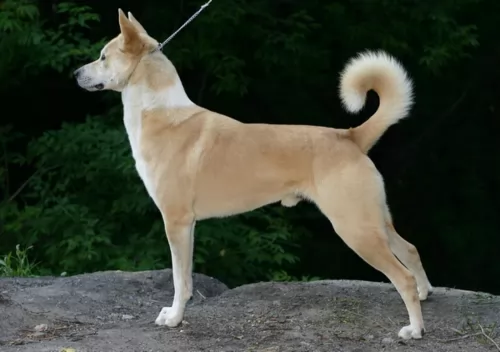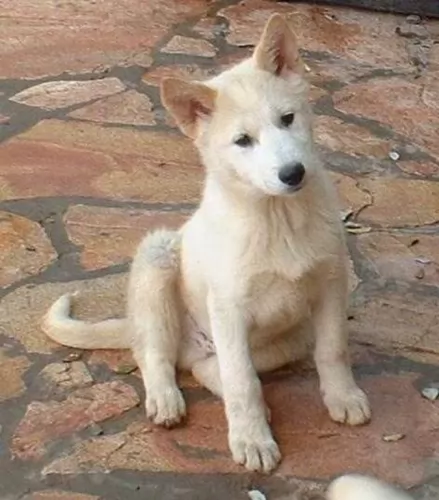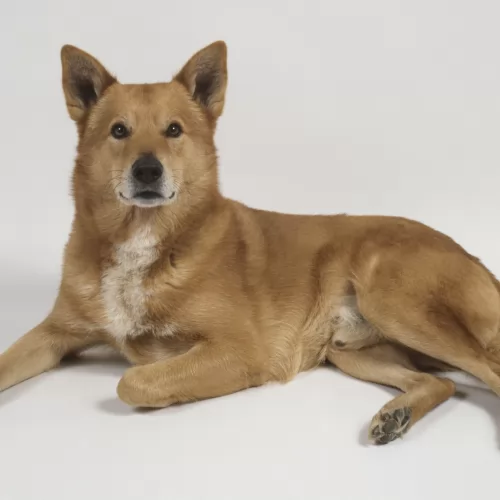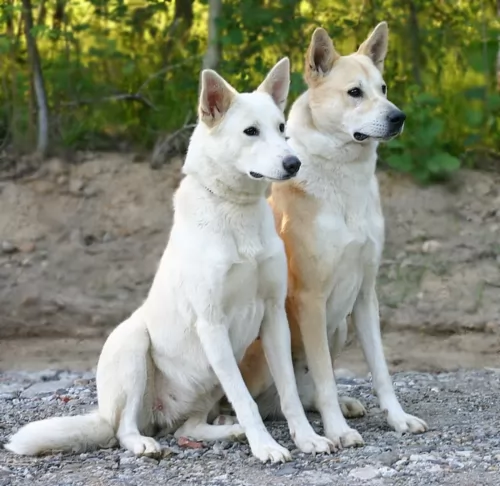 Canaan Dog is originated from Israel but Yochon is originated from United States. Canaan Dog may grow 33 cm / 13 inches higher than Yochon. Canaan Dog may weigh 16 kg / 36 pounds more than Yochon. Both Canaan Dog and Yochon has almost same life span. Both Canaan Dog and Yochon has almost same litter size. Canaan Dog requires Low Maintenance. But Yochon requires Moderate Maintenance
Canaan Dog is originated from Israel but Yochon is originated from United States. Canaan Dog may grow 33 cm / 13 inches higher than Yochon. Canaan Dog may weigh 16 kg / 36 pounds more than Yochon. Both Canaan Dog and Yochon has almost same life span. Both Canaan Dog and Yochon has almost same litter size. Canaan Dog requires Low Maintenance. But Yochon requires Moderate Maintenance
Basic Information
undefined
Israel
United States
Life Span:
10 - 15 Years
10 - 14 Years
Other Names:
Kelev K'naani, Kaleb Kanaani
Bichyorkie • Borkie • Yo-Chon • Yochon • Yorki-Chon • Yorkichon • Yorkiechon • Yorkie-Chon • Yorkie-Bichon • Yorkshire Frise
Colors Available:
Sandy, brown, black, white or bi-colored
Black, Blonde, Brown, Cream, Dark, Brown, Golden, Gray, White
Coat:
Medium length and coarse
silky or curly very full coat
Shedding:
Minimal, Seasonal
Minimal
Temperament:
Affectionate, Alert, Cheerful, Curious, Energetic, Friendly, Independent, Intelligent, Lively, Loving, Loyal, Outgoing, Playful, Protective, Responsive, Stubborn, Territorial
Alert, Energetic, Friendly, Independent, Intelligent, Loving, Playful
Grooming:
Low Maintenance
Moderate Maintenance
Trainability:
Easy
Moderate
New Owners Friendly:
Yes
Yes
History
 The Canaan Dog is an attractive dog and is Israel’s national breed. Research reveals that the dog’s history can be traced way back to 2200BC.
The Canaan Dog is an attractive dog and is Israel’s national breed. Research reveals that the dog’s history can be traced way back to 2200BC.
The dog’s origins go back to the pariah dog of the Middle East. It is believed that the dog has been perceived as a sacred animal and that he was both guard- and herd dog of the ancient Israelites.
A certain Dr Rudolphina Menzel moved from Vienna to Israel and was asked to establish a service dog organization. She trained and bred them, finding them to be highly trainable. She began a breeding program in 1934, providing working dogs for the military and starting a selective breeding program for the Canaan dog. The Israel Kennel Club dog recognized the Canaan for the first time in 1953.
The Yochon is a “designer dog” – a cross between the Yorkshire Terrier and the Bichon Frise. They are not a purebred and are not recognized by purebred dog clubs such as the American Kennel Club (AKC). They are small, playful, families dogs. Most of them bear the best characteristics of each of their founding breeds, but because they are crossbreeds and most will be multi-generational cross breeds, there are no two dogs alike.
Though not recognized by the traditional purebred clubs they are recognized by several hybrid canine clubs. The cross was developed in the United States.
Description
Appearance:
 The Canaan Dog is lean, standing at between 51–61cm and weighing roughly 18-25kg. The medium sized Canaan Dog’s coat is medium length and can be sandy to brown, white or black or a mix of these. The eyes are dark and inquisitive, the ears are erect and the high set bushy tail is curled over the back.
The Canaan Dog is lean, standing at between 51–61cm and weighing roughly 18-25kg. The medium sized Canaan Dog’s coat is medium length and can be sandy to brown, white or black or a mix of these. The eyes are dark and inquisitive, the ears are erect and the high set bushy tail is curled over the back.
Temperament:
The Canaan Dog is alert, intelligent, confident and territorial. They are wary of strangers and because they’re alert they’re constantly aware of movement, making them a superb watchdog. However, the dog isn’t aggressive and he makes an excellent family pet, even around children and other pets.
He will need training and socialization though to make him obedient and amicable. He is a strong-willed dog. He is co-operative when being trained and responds well. They are energetic and will make a good companion for runners and cyclists.
Yochons go by many different names but in general they are toy dogs, weighing in at under 20 pounds, most weighing 6-12 pounds. They have black noses, long tails, and round eyes. Their muzzles are blunt and their skulls are also round.
They have fluffy, full coats that can range from tan, to brown to black. They can also be white or cream. Their ears can be either hanging or erect.
Characteristics
 The Canaan Dog is an intelligent dog and this makes him easy to train. He is a strong-willed, independent dog and will require training and socialization to make him obedient. He is an affectionate and loving dog and will make a wonderful family pet.
The Canaan Dog is an intelligent dog and this makes him easy to train. He is a strong-willed, independent dog and will require training and socialization to make him obedient. He is an affectionate and loving dog and will make a wonderful family pet.
The Canaan Dog is also a fairly healthy, robust breed and appeals to many dog owners who don’t have to spend money on professional grooming for him. He doesn’t require much – isn’t high maintenance at all and he is just waiting to become a member of a human family where he can be loved and cared for just like any other family member.
1 Children friendliness -yes very good but watch careful that children do not hurt them as they are so small and fragile.
2.Special talents – Loves families and playing
3.Adaptability – adapts well to apartments can play indoors
4.Learning ability – intelligent and independent
Health Problems
 The Canaan Dog has a strong immune system and with good care from his owner he can reach 15 years of age. He has been used to living in harsh conditions in the deserts of Israel.
The Canaan Dog has a strong immune system and with good care from his owner he can reach 15 years of age. He has been used to living in harsh conditions in the deserts of Israel.
If you want to buy a Canaan dog, as with any dog, a good breeder will be able to produce health certificates for the puppy's parents. These certificates confirm that the dog has been tested and cleared of certain common conditions that affect dogs.
Because hip dysplasia is such a common problem with dogs, you may want to see health certificates from the Orthopedic Foundation for Animals (OCA).
A form of cancer that you might expect to see in this breed is Lymphosarcoma, a cancer which affects the lymphoid system. The lymphoid system is a critical part of the dog’s immune system to fight off viruses and bacteria.
Both founding breeds are vulnerable to a few medical conditions. These include:
• Legg-Calve-Perthes Disease – insufficient blood to hind legs, thigh bones causing lameness.
• Patellar Luxation – slipped kneecaps can also cause lameness.
• Dental Issues – keep teeth brushed and cleaned.
• Hypothyroidism – can be treated with medication.
• Reverse Sneezing
• Allergies
• Collapsed Trachea due to small size – be careful with them at all times.
Caring The Pet
Diet:
 The Canaan Dog needs a steady diet of high-quality food, whether you provide your own home-made food or you buy commercially manufactured food. A healthy diet full of minerals and vitamins is essential for good health. If you’re not sure how to feed your Canaan dog, your veterinarian can advise you according to your dog’s age.
The Canaan Dog needs a steady diet of high-quality food, whether you provide your own home-made food or you buy commercially manufactured food. A healthy diet full of minerals and vitamins is essential for good health. If you’re not sure how to feed your Canaan dog, your veterinarian can advise you according to your dog’s age.
Remember that dogs are carnivorous so even though raw meat can be pretty expensive, you want to include it in his diet from time to time to stave off itchy, dry skin rashes and other illnesses. Always see to it that there is a bowl of fresh, cool water 24/7.
Grooming:
The Canaan Dog is a low maintenance breed who has moderate, seasonal shedding. The coat is easy to groom. He will need a good brush twice a week to keep him free of loose hairs and to keep his coat shiny.
Other kinds of grooming are also important such as brushing his teeth 2 or 3x a week to remove tartar build-up. Bad teeth can affect the immune system and make him ill.
Exercise:
Canaans are going to require a moderate amount of exercise. Just like with any dog, you can’t just buy a cute puppy and when he becomes an adult and no longer cute to you, forget about him in the backyard. A dog is a 15 year responsibility and he will need regular walks and games from you to guarantee his health and happiness.
3.Feeding the puppy – do not overfeed. Use a high quality puppy toy breed kibble. Feed 3-4 X day.
2.Feeding the adult – do not overfeed. Use a high quality adult toy breed kibble. Feed at least twice a day.
3.Points for Good Health hearty/general good health and stamina
4. Games and Exercises does not need a lot of exercise . They enjoy obedience and agility trials.
Comparison with other breeds
- Canaan Dog vs English Bulldog - Breed Comparison
- Canaan Dog vs German Shepherd - Breed Comparison
- Canaan Dog vs Golden Retriever - Breed Comparison
- Canaan Dog vs Labrador Retriever - Breed Comparison
- Canaan Dog vs West Highland White Terrier - Breed Comparison
- Canaan Dog vs French Bulldog - Breed Comparison
- Canaan Dog vs Beagle - Breed Comparison
- Canaan Dog vs Yorkshire Terrier - Breed Comparison
- Canaan Dog vs Poodle - Breed Comparison
- Canaan Dog vs Rottweiler - Breed Comparison
- Canaan Dog vs Boxer - Breed Comparison
- Canaan Dog vs English Pointer - Breed Comparison
- Canaan Dog vs Siberian Husky - Breed Comparison
- Canaan Dog vs Doberman Pinscher - Breed Comparison
- Canaan Dog vs American Bully - Breed Comparison
- Canaan Dog vs Abruzzenhund - Breed Comparison
- Canaan Dog vs Affenpinscher - Breed Comparison
- Canaan Dog vs Afghan Hound - Breed Comparison
- Canaan Dog vs Aidi - Breed Comparison
- Canaan Dog vs Airedale Terrier - Breed Comparison
- Canaan Dog vs Akbash Dog - Breed Comparison
- Canaan Dog vs Akita - Breed Comparison
- Canaan Dog vs Africanis - Breed Comparison
- Canaan Dog vs Askal - Breed Comparison
- Canaan Dog vs Atlas Terrier - Breed Comparison
- Yochon vs English Bulldog - Breed Comparison
- Yochon vs German Shepherd - Breed Comparison
- Yochon vs Golden Retriever - Breed Comparison
- Yochon vs Labrador Retriever - Breed Comparison
- Yochon vs West Highland White Terrier - Breed Comparison
- Yochon vs French Bulldog - Breed Comparison
- Yochon vs Beagle - Breed Comparison
- Yochon vs Yorkshire Terrier - Breed Comparison
- Yochon vs Poodle - Breed Comparison
- Yochon vs Rottweiler - Breed Comparison
- Yochon vs Boxer - Breed Comparison
- Yochon vs English Pointer - Breed Comparison
- Yochon vs Siberian Husky - Breed Comparison
- Yochon vs Doberman Pinscher - Breed Comparison
- Yochon vs American Bully - Breed Comparison
- Yochon vs Abruzzenhund - Breed Comparison
- Yochon vs Affenpinscher - Breed Comparison
- Yochon vs Afghan Hound - Breed Comparison
- Yochon vs Aidi - Breed Comparison
- Yochon vs Airedale Terrier - Breed Comparison
- Yochon vs Akbash Dog - Breed Comparison
- Yochon vs Akita - Breed Comparison
- Yochon vs Africanis - Breed Comparison
- Yochon vs Askal - Breed Comparison
- Yochon vs Atlas Terrier - Breed Comparison
 Petzlover
Petzlover Canaan Dog is originated from Israel but Yochon is originated from United States. Canaan Dog may grow 33 cm / 13 inches higher than Yochon. Canaan Dog may weigh 16 kg / 36 pounds more than Yochon. Both Canaan Dog and Yochon has almost same life span. Both Canaan Dog and Yochon has almost same litter size. Canaan Dog requires Low Maintenance. But Yochon requires Moderate Maintenance
Canaan Dog is originated from Israel but Yochon is originated from United States. Canaan Dog may grow 33 cm / 13 inches higher than Yochon. Canaan Dog may weigh 16 kg / 36 pounds more than Yochon. Both Canaan Dog and Yochon has almost same life span. Both Canaan Dog and Yochon has almost same litter size. Canaan Dog requires Low Maintenance. But Yochon requires Moderate Maintenance The Canaan Dog is an attractive dog and is Israel’s national breed. Research reveals that the dog’s history can be traced way back to 2200BC.
The Canaan Dog is an attractive dog and is Israel’s national breed. Research reveals that the dog’s history can be traced way back to 2200BC. The Canaan Dog is lean, standing at between 51–61cm and weighing roughly 18-25kg. The medium sized Canaan Dog’s coat is medium length and can be sandy to brown, white or black or a mix of these. The eyes are dark and inquisitive, the ears are erect and the high set bushy tail is curled over the back.
The Canaan Dog is lean, standing at between 51–61cm and weighing roughly 18-25kg. The medium sized Canaan Dog’s coat is medium length and can be sandy to brown, white or black or a mix of these. The eyes are dark and inquisitive, the ears are erect and the high set bushy tail is curled over the back. The Canaan Dog is an intelligent dog and this makes him easy to train. He is a strong-willed, independent dog and will require training and socialization to make him obedient. He is an affectionate and loving dog and will make a wonderful family pet.
The Canaan Dog is an intelligent dog and this makes him easy to train. He is a strong-willed, independent dog and will require training and socialization to make him obedient. He is an affectionate and loving dog and will make a wonderful family pet. The Canaan Dog has a strong immune system and with good care from his owner he can reach 15 years of age. He has been used to living in harsh conditions in the deserts of Israel.
The Canaan Dog has a strong immune system and with good care from his owner he can reach 15 years of age. He has been used to living in harsh conditions in the deserts of Israel. The Canaan Dog needs a steady diet of high-quality food, whether you provide your own home-made food or you buy commercially manufactured food. A healthy diet full of minerals and vitamins is essential for good health. If you’re not sure how to feed your Canaan dog, your veterinarian can advise you according to your dog’s age.
The Canaan Dog needs a steady diet of high-quality food, whether you provide your own home-made food or you buy commercially manufactured food. A healthy diet full of minerals and vitamins is essential for good health. If you’re not sure how to feed your Canaan dog, your veterinarian can advise you according to your dog’s age.